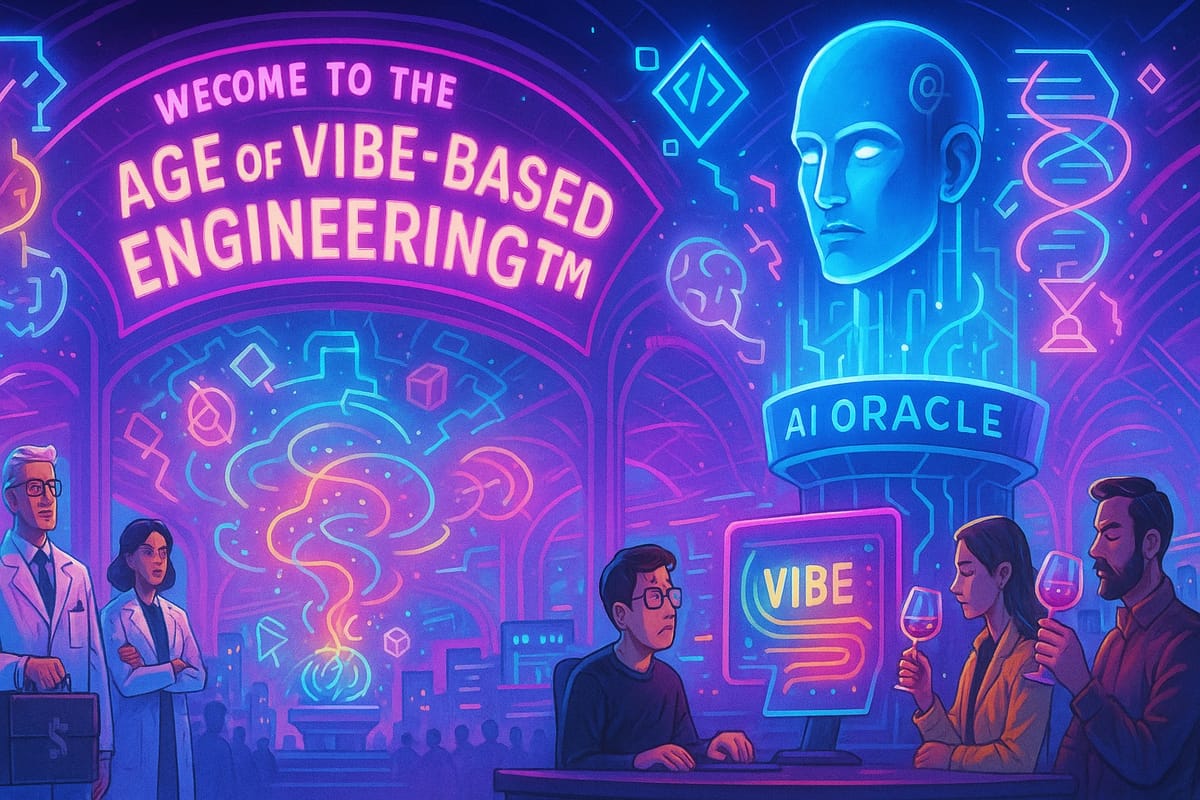Welcome to the Glorious Future Where You’ll Never Need to Understand Anything Ever Again
... And when it works, which it doesn’t, but let’s pretend, you call it “agent-based architecture.” When it doesn’t, well, obviously that’s a “context window limitation.” ...

So, let me tell you about this truly revolutionary idea that’s going to change your life: coding is over. That’s right. Dead. Obsolete. Extinct. In just a few short years, all of software engineering will be handled by AI that magically understands your every vague thought, emotional whim, and half-finished Slack message.
Forget loops, forget syntax, forget even knowing what your product does, that’s for the peasants of 2019. We’re now entering the Age of Vibe-Based Engineering™, where you just “describe what you want” and, through the divine intervention of a neural net and some venture capital, it gets built. It’s like manifestation, but with GPUs.
And who’s leading us into this magical frontier? A team of elite MIT savants, obviously, who bravely pivoted from reinventing CAD for mechanical engineers (because why not start there?) to conquering all of software development. Because if there’s one thing AI teaches us, it’s that domain knowledge is overrated. The real skill is pivoting quickly and confidently, preferably with millions in seed funding.
Now, don’t get it twisted, they’re not just autocompleting code. No, no. This is a $9 billion AI oracle that understands your soul. It sits next to you, watches what you do, occasionally taps you on the shoulder, and says, “Hey, wanna ship that half-broken feature you didn’t ask for?” And when it works, which it doesn’t, but let’s pretend, you call it “agent-based architecture.” When it doesn’t, well, obviously that’s a “context window limitation.”
Oh, and taste. Don’t forget taste. That’s the new most important skill in software. Not writing code, not solving problems, but having “taste.” That ineffable genius-level intuition that tells you whether your modal should slide up or fade in. You’re no longer a developer. You’re a software sommelier. Sip on this JSON payload. Smells like… legacy debt and desperation.
And how do we know it’s working? Metrics! You see, they don’t measure old, crusty things like “bug rates” or “user satisfaction.” No, they track paid power users, those enlightened few who click “Accept” on AI code suggestions five days a week. Because clearly, if someone keeps using a product, it must be working… even if their app crashes every time they open a dropdown menu.
Of course, we’re told this is only the beginning. Once the models get “just a little smarter,” everything will fall into place. Which we’ve been saying since GPT-2. And GPT-3. And Codex. And Copilot. But this time it’s definitely true. We just need another five years, ten million tokens, and a couple billion more in compute costs, and then you’ll finally be able to build a bank, a video game, and a space mission by saying, “Make it cool and fast.”
And let’s not forget the editor revolution. The brave decision to not build an extension, but a full custom IDE. Bold. Disruptive. Because the one thing developers love is abandoning their workflows to adopt a janky beta tool that freezes every time you try to rename a variable.
Look, it’s not a cult. It’s a movement. A vision. A near-religious belief that the models will continue to get better and that we should all be building like we’re one prompt away from eliminating front-end engineering forever. You just have to believe. And if you don’t see it working yet, that’s your fault for not “following the line.”
So buckle up. The future is here. It’s got a trillion parameters, an unsustainable burn rate, and a roadmap built entirely out of TED Talk punchlines. But who needs working software when you’ve got the vibe?